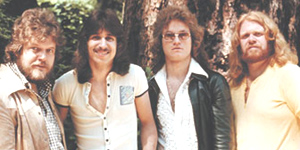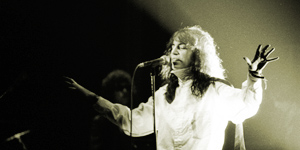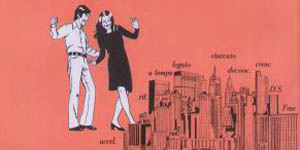The 100 Greatest Songs of the 1970s, Part I.
Despite clemency requests through official channels, emotional pleadings for mercy, and cries from all quarters of “Oh, dear God, make it stop,” I hereby present my 100 Greatest Songs of the 1970s. A couple prefatory remarks, and then we’ll get down on it:
First, because I don’t feel any pressure to compete with a Pitchfork (may-they-reign-forever) feature, this will be a much less, shall we say, adventurous list than my 1960s one. Also, since they didn’t take all the good songs first on this go-round, it will be a more obvious one. As such, it only contains songs that I personally love the hell out of, whatever their artistic merit or setting-the-stage-for-modern-indie-rock cred.
On a similar tip, “greatest” is of course a totally subjective adjective. These are my greatest songs. Don’t like them? Go make your own damn list.
Structurally, I only included one song per artist. This is because some artists, like say David Bowie, could have a top-hundred-songs-of-the-70s all to themselves. So if you come across a song you think totally sucks and shouldn’t even be near these rarified precincts, just substitute a David Bowie, Rolling Stones, or Clash song. They would almost certainly have taken the spot if allowed. Oh, and the order this time is very precisely calibrated. Position is a value judgment. If your favorite band is low on the list, ha ha they suck. (Well, no. Then they’d be off the list. But still.) And I’m only doing five at a time this time, apparently because I want to drag it out agonizingly. My write-ups are slightly longer, though, if that’s any consolation.
Finally, a word abouy my blind spots. While I dearly love to project an all-world-knowledge-at-my-fingertips image, there are vast tracts of the music world I remain largely unfamiliar with. Heavy metal, reggae, country, jazz, krautrock, and anything from outside the English-speaking world are mostly given token nods here. This is very much a rock & roll list. So be it.
Now, let’s all enjoy a good laugh at the first thing on the list, shall we?
100. Bachman-Turner Overdrive “Takin’ Care of Business”
(Randy Bachman)
Bachman-Turner Overdrive II, 1973
Yeah, what? It’s — well, it’s fun. It comes on the radio, and even though you know it’s dumb, cheesy, overblown corporate rock, you turn it up a little bit, and bounce in your seat, and maybe keep time on the steering wheel. It was still early enough in the decade that the production hadn’t glossed the energy out of it, and that wet drum-shuffle sound just gallops along. Mostly, though, I’d have to say it’s the piano. After about 1975, you never hear good old-fashioned honky-tonk piano in a rock & roll song unless the band is being comically retro, or Billy Joel. Little Richard and Jerry Lee Lewis were better at their pianos (and scarier) than Chuck Berry and Scotty Moore at their guitars, but because John Lennon played rhythm guitar instead of piano, rock has gradually left the poor old Steinway behind. Keyboardists today want to be Brian Eno and apply “texture,” leaving energy to the rhythm section. Even though the piano — check your fourth-grade music-class orchestra diagrams — is a rhythm instrument. But back to BTO. The song’s about joining the hedonistic life of the rock star, dropping out of the annoying real jobs and picking up a second-hand guitar. Actually, Randy, chances are you’ll end up having to go straight back to the suit and tie, but way to encourage the competition. It can’t be a coincidence that the most unrealistic image of the rock & roll life is also the most giddy fun.
099. Patti Smith “Dancing Barefoot”
(Ivan Kral/Patti Smith)
Wave, 1979
All right, finally, some credibility to the list! (And with that, I’m done addressing the cred/lack of cred in these choices. Up yours, indie snob that lives in the back of my head!) Patti Smith occupies a strange place in the rock & roll pantheon: lyrics pretentious enough for any prog-rocker, but her mystic voodoo jive is in the service of stripped-down chords, chunky riffs and the leaden New York art-punk beat. She self-consciously cultivated a marble-cool shaman-poet persona, half Witch of Endor and half James Dean, and helped to define punk as a writer before issuing one of the first classic LPs of the stuff. Punk only in the garage-band sense, though, without the speed-fueled adrenaline of the MC5 or the aggressive sheets of noise of the Stooges, and more soggily literary than either. She could both chant side-long earth-mother melanges and ride the charts with a Springsteen song, but this captures her at her leanest and best: the lyrics are still a big gooey quasi-religious feminist mess, but it’s true rather than provocative, and the music is as straight-up rock & roll as she ever managed to get. Her half-sobbing voice on the chorus brings to mind religious ecstasy as well as the more earthly kind, and the free-verse recital at the end neither overstays its welcome nor makes people who know real poetry wince. And that might be her highest achievement in rock.
098. The Who “Baba O’Riley”
(Pete Townshend)
Who’s Next, 1971
First, this was so not the first real use of synthesizers as a defining element in rock music. Silver Apples, the United States of America, and the Nice can walk away with those prizes. And the backstory about how Pete came up with the synth line — he punched his guru Baba Yaga’s vital stats into a sequencer — is vaguely interesting for gearheads, but it’s got nothing to do with the song. Which is one of the most lovely surprises of classic rock radio. The Who were the epitome of Youth in the 60s. Not just the “hope I die before I get old” chestnut, but the sheer exuberance of their 60s singles, the awkward callowness of Tommy, the adolescent humor of “A Quick One While He’s Away,” and the common youthful confusion between black American music and increased volume. But with Who’s Next, they matured. Slightly. “Baba O’Riley” is notable for being just about the first externally-focused song (that wasn’t funny) that Pete ever wrote, as the lyrics take on the perspective of an older, working-class couple that is bewildered and not very pleased by the wide-sweeping youth-cultural change of the 60s. The other half of the coin, of course, is the last track on the album, but this one actually does a better job of showcasing the Who’s bombastic new sound, a continual rise to peak after peak, with guests Nicky Hopkins and Dave Arbus adding a more civilized European sheen — though without compromising the pummeling force — to the overwhelming hard rock of the greatest power trio (plus Roger Daltrey) of all time.
097. The Allman Brothers Band “Melissa”
(Steve Alaimo/Gregg Allman)
Eat a Peach, 1972
It’s Duane’s last song. Not actually his literal last song — that’s still only on vinyl, dammit. (Good, though. “Dearest I Wonder” on Bobby Whitlock’s Raw Velvet, 1972. Seek it out.) But his fingerprints are all over it; he helped Gregg shape it way back in 1967, and it’s the finest ballad by the band that bears his name, the band he and his brother led to transform American rock & roll from something reactive, wanting to be the Beatles or the Rolling Stones, to something active, something that dug deep into its own native soil, into the deep country, blues, soul, and jazz roots of the American South and transformed them into a new and blistering kind of hard rock. Of course, “Melissa” isn’t hard rock at all; it’s an elegant hobo ballad, half country-rock and half country-soul, with blues changes like Arthur Alexander used to work, and Dickie Betts slips and slides all around it, making a kind of halo out of his guitar lines, flirting with transcendence. He was never the prodigal genius that Duane was, but here he almost reaches for those heights, in a song that is both a magnificently simple elegy for the dead bandmember and a universal cry of loneliness, regret and heartache. “Crossroads, will you ever let him go” is one of the great opening lines in, hell, in all of literature, as far as I’m concerned, nailing so perfectly a certain remorseful desperation that everyone knows, and which the stereotypical Allman Brothers fan stereotypically drinks to forget. There’s a tear in this beer.
096. Human League “Being Boiled”
(Ian Craig Marsh/Philip Oakey)
single, 1978
David Bowie famously called this song the sound of the future, and it’s always startling how prescient he could be. It’s the first English pop song to be produced entirely with synthesizer and voice, predicting three generations of synth-pop, techno and (god) IDM. Of course, “pop” is a relative term; it didn’t do much to the charts, and its vaguely Nietzschean lyrics about boiling children alive and listening to the voice of Buddha, intoned in an icy monotone by a Kraftwerk-biting Philip Oakey, weren’t exactly calibrated to win over the hearts and minds of the average Bay City Rollers fan. It’s deeply post-punk, even though the synthesized throbs and loops are warmer and more inviting than the usual jagged guitar shards; but if this evokes the kind of futuristic urban nightlife usually conjured up by early synthpop, it’s one in which every shadow hides a skulking psychopath and the city lights are just as likely to blind you to your death as to give a sense of sophisticated cool. They’d go on to conquer charts and the hearts of easily-swayed pop kids in the MTV era, but before they acquired the female singers and the dance beats, two computer programmers, a hospital porter, and a visual designer sat in a dark, squalid room and punched keys on a second-hand machine to create the glistening future of pop music.
Next: 095-091. >>

No comments:
Post a Comment